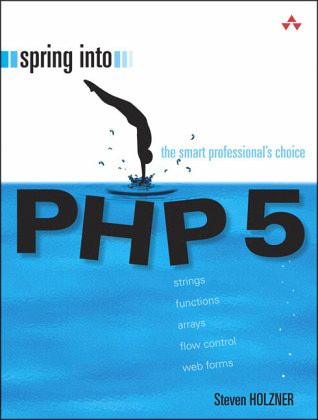Nicht lieferbar

Spring Into PHP 5
Versandkostenfrei!
Nicht lieferbar
This is the PHP 5 entry in the new Spring Into series. It is written in theunique, structured style of Spring Into books. Each chapter begins withintroductory text, followed by a single-page or facing-page tutorial. Everychapter is semi-autonomous, and focuses on an example or set of examplesallowing the reader to quickly learn and apply. The discussions are to the pointand emphasize results without extraneous coding. In 350 pages, Spring IntoPHP 5 is designed to give professionals the skills they need to be productivewith PHP 5--quickly--by covering dozens of chunks in rapid-fire format.PHP i...
This is the PHP 5 entry in the new Spring Into series. It is written in the
unique, structured style of Spring Into books. Each chapter begins with
introductory text, followed by a single-page or facing-page tutorial. Every
chapter is semi-autonomous, and focuses on an example or set of examples
allowing the reader to quickly learn and apply. The discussions are to the point
and emphasize results without extraneous coding. In 350 pages, Spring Into
PHP 5 is designed to give professionals the skills they need to be productive
with PHP 5--quickly--by covering dozens of chunks in rapid-fire format.
PHP is clearly emerging as the most popular language for the creation of web
applications. PHP 5 is the next major revision of the language. It provides a
top-notch object system that behaves the way traditional heavyweight
languages do, as well as real exceptions. In addition to these language additions,
PHP 5 offers robust XML processing, improved MySQL and SQLite database
support and a large number of improvements to areas of efficiency,
extensibility and security. According to Netcraft's August 2004 survey, over 16
million domains run PHP. By comparison, Netcraft reports 2.5 million
domains running ASP.Net.
unique, structured style of Spring Into books. Each chapter begins with
introductory text, followed by a single-page or facing-page tutorial. Every
chapter is semi-autonomous, and focuses on an example or set of examples
allowing the reader to quickly learn and apply. The discussions are to the point
and emphasize results without extraneous coding. In 350 pages, Spring Into
PHP 5 is designed to give professionals the skills they need to be productive
with PHP 5--quickly--by covering dozens of chunks in rapid-fire format.
PHP is clearly emerging as the most popular language for the creation of web
applications. PHP 5 is the next major revision of the language. It provides a
top-notch object system that behaves the way traditional heavyweight
languages do, as well as real exceptions. In addition to these language additions,
PHP 5 offers robust XML processing, improved MySQL and SQLite database
support and a large number of improvements to areas of efficiency,
extensibility and security. According to Netcraft's August 2004 survey, over 16
million domains run PHP. By comparison, Netcraft reports 2.5 million
domains running ASP.Net.



